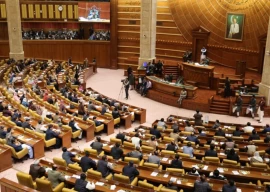
The new constitution, promulgated in 1962, guaranteed the right to freedom of expression under Article 6, but it too failed to provide for the right to freedom of press. The constitution of 1962 was soon abrogated by the military regime of General Yahya Khan and after his regime fell, the democratically elected government of Zulfikar Ali Bhutto set about formulating yet another constitution for Pakistan — a task which was completed in 1973. It was a ‘consensus Constitution’ — all parties concerned seemed satisfied. The Constitution of 1973 guaranteed the right to freedom of speech and expression under Article 19 and it also guaranteed the right to freedom of press.
The Constitution guaranteed that all citizens of Pakistan shall be free to express opinions and ideas, without being punished for doing so. This means that citizens may speak their mind, put their ideas or opinions in writing, get them published, post them over the internet, or express as they feel in any manner possible — this includes various art forms and any other perceptible statement. This includes the right to seek, receive and impart information, ideas or opinions, in any form which may be available.
Pakistan has had a chequered history of freedom of press. Pakistan enjoyed a very brief period during which there was complete freedom of press and that ended with the death of Muhammad Ali Jinnah. Soon after, newspapers started getting banned and their editors were hauled off to prisons. Successive governments continued to arm-twist the press. A number of laws were enacted to restrict freedom of the press and to browbeat journalists into keeping the truth from the public.
It should be noted that countries around the world impose some reasonable restrictions on the freedom of speech. Absolute freedom of speech is bound to be misused by certain elements and have negative effects on society. Nothing should be expressed in a way, which may defame someone or may offend the notions of morality of a person, or may incite someone to an act of lawlessness.
Published in The Express Tribune, June 19th, 2013.


1672385156-0/Andrew-Tate-(1)1672385156-0-165x106.webp)




1732012115-0/Untitled-design-(14)1732012115-0-270x192.webp)









COMMENTS
Comments are moderated and generally will be posted if they are on-topic and not abusive.
For more information, please see our Comments FAQ